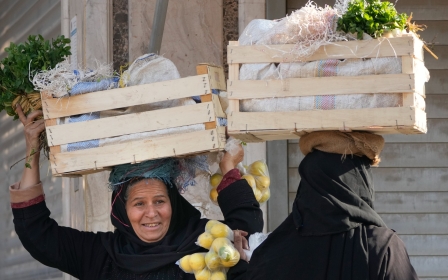Egypt: Three TikTok influencers arrested after parody video of jail visit

Three Egyptian TikTok content creators were arrested on charges of belonging to a banned group and spreading false news, the Egyptian Front for Human Rights (EFHR) said on Monday.
Basma Hegazi, Mohamed Hossam el-Dien and Ahmad Ali el-Kholi were arrested on 25 January after making a parody video about visiting inmates in Egyptian jails titled "The visit".
EFHR said on Monday the trio will remain in pretrial detention for 15 days pending investigation. They face charges of belonging to a "terror group, misusing social media, and spreading false news".
In the video posted on 13 January, Hossam el-Dien plays a comic thug named Bisa in a deprived area of Alexandria who always runs into trouble and gets arrested. Hegazi plays a savvy woman named Warda who rushes to his rescue and comes to visit him in jail.
New MEE newsletter: Jerusalem Dispatch
Sign up to get the latest insights and analysis on Israel-Palestine, alongside Turkey Unpacked and other MEE newsletters
The video has registered more than seven million views and 254,000 likes on TikTok.
Following news of their arrest, content made by the TikTok content creators was widely reshared on social media, including "The visit" video.
The Egyptian government, led by President Abdel Fattah el-Sisi, has previously faced criticism by human rights campaigners for using a controversial cybercrime law to prosecute TikTok influencers.
Not only can authorities imprison and fine people for content posted online deemed to be inconsistent with family principles or the values of Egyptian society, the law also allows any social media accounts with more than 5,000 followers to be monitored.
Last year, an Egyptian court sentenced TikTok influencer Haneen Hossam to three years in prison and a fine of 200,000 pounds ($10,759) after a retrial convicted her of "human trafficking".
The charge was brought against her in relation to an Instagram video in which she encouraged women over 18 to post videos of themselves on the app Likee to earn money. Amnesty International said the video had "no credible evidence linking her to any internationally recognisable crime".
The London-based rights group urged Egyptian authorities to end their crackdown on female TikTok users, denouncing the charges against them as "absurd".
Middle East Eye delivers independent and unrivalled coverage and analysis of the Middle East, North Africa and beyond. To learn more about republishing this content and the associated fees, please fill out this form. More about MEE can be found here.





